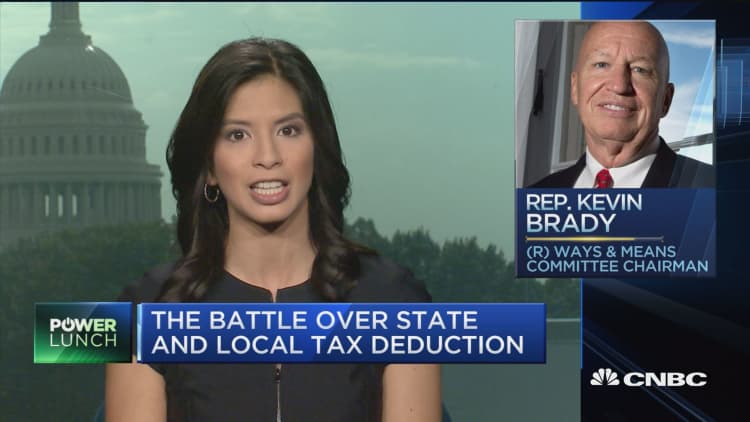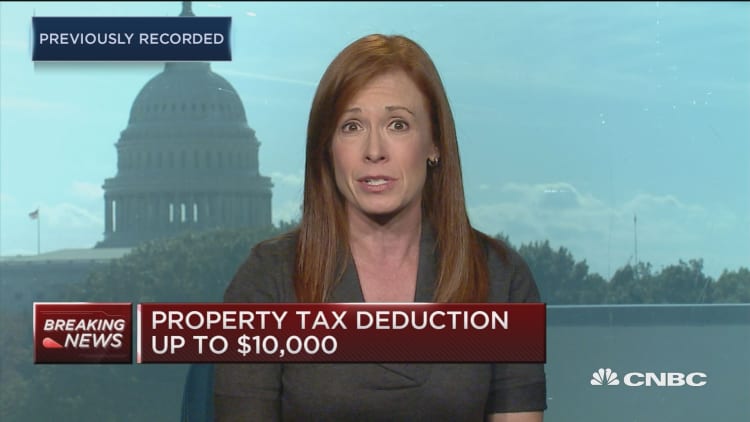The could put a dent in home values in high-tax states and create looming credit risks for local governments.
S&P Global Ratings said this week that the proposals to eliminate state and local tax deductions could be a direct blow to residents of high tax states because of the potential hit to property values. In turn, there could "be a credit impact from both the tax base reductions and resulting lower tax revenues" for local governments dependent on property taxes.
Most affected are California, New York, and New Jersey, while states with lower taxes, like Florida and Texas, could see benefits, the S&P analysts said.
The its version of the tax bill Thursday, ending deductions of state income taxes and limiting property tax deductions to $10,000. The Senate version, yet to be approved, would eliminate deductions entirely for property taxes.

"This is one deduction that really strikes at the heart of middle America, particularly in California," said California State Controller Betty Yee, in an interview. "We're looking at really affecting families that have to think about other ways to provide financial security. Do they want a home to provide them some security over the longer term? It would affect retirement security, the local budgets, state budget and credit risk not only at a state and local level but on an individual level."
She said "equity could be sucked out" of homes, as the impact ripples across the real estate market.
Yee said another major issue for California is the proposal to eliminate mortgage deductions over $500,000 since California has seven of the 10 most affected cities, including San Francisco, San Jose, and Orange County.
Traders say the potential negative from the elimination of state and local taxes is widely discussed on trading desks, but so far has not spilled into pricing on individual issues as the final version is awaited.
The municipal market has been reeling from the other aspects of the Congressional tax proposals, which could greatly reduce the amount of new tax-free muni bond issuance if the most sweeping changes are finalized.
The House Thursday voted to eliminate tax used by universities, hospitals and lower income housing, as well as advanced refundings, which is about one-quarter of muni issuance. The Senate, however, proposes retaining the private activity bonds, about 20 percent of issuance, but would still eliminate advanced refundings, which are issues that are used to replace an earlier bond deal that would be repaid at some future date.
S&P said the proposed changes in both bills will likely lead to higher borrowing costs for municipal issuers, and that would add to budget strains.
However, these proposals have so far been a positive for the market, drawing in buyers on the prospect that there could be fewer issues in the future, depending on which proposals ultimately become law. It has also created a rush of activity as issuers attempt to tap the market this year ahead of the changes.
Yee has said eliminating the state and local tax deduction would increase tax burdens on about 5.8 million California households, which currently deduct $12,000 each on average and are mostly middle-income earners. The House version, with a $10,000 cap on the property tax deduction, would affect about 560,000 California tax filings. She said there would be a chill on housing prices and some homeowners risk becoming "under water" on mortgages.
"What we're probably going to see is a reassessment of these properties with the declining values…That would translate to less property tax revenue for municipalities and states," she said. "To the extent there is bonded indebtedness against that property tax revenue source, we would see some credit downgrades."
S&P senior director Jane Ridley said even with the doubling of the standard deduction to $24,000, the proposal would hit high tax state residents hard, but the ripple effect has yet to be seen. Analyst say it could move in slow motion with home sales slowing, prices coming down and then valuations falling on the tax books.
"It depends over time, and how does that play out," said Ridley, noting there could be pressure on some of the local government credits.
Tax payers in the most impacted state could also see positive from
Laura Porter, Fitch managing director, said one impact may be that it will be more difficult for states and local governments in high tax states, including Connecticut and Massachusetts, to raise taxes on residents who are effectively getting a tax increase from the elimination of the deduction.
"What it could affect is revenue growth prospects for the local government over time. That could make budgeting hard, but we wouldn't' see immediate impact. Over time it's always a challenge for governments to match revenues with spending . On the state level in particular, revenue growth has been really slow," she said, adding anything that hurts the ability to raise revenues hurts flexibility.
According to Trulia, the greater New York City area would be particularly hard hit. It said in Long Island, 46.5 percent of property tax payers pay more than $10,000 a year, and for Newark, N.J. area that number is 33.7 percent.
WATCH: Homebuilder stocks fall on mortgage deduction proposal



